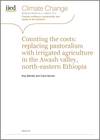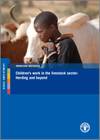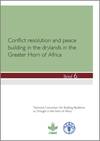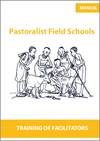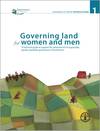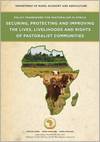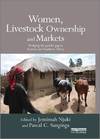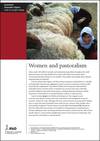This study calculates the economic benefits and opportunity costs of three alternative agricultural systems – pastoral livestock production versus cotton and sugar cane estates on the banks of the Awash River in north-eastern Ethiopia. These traditional pastoral grazing areas were converted into large-scale irrigated cotton and sugar plantations in the 1960s. The findings suggest that pastoralism is a surer investment in the longer term resilience and economic stability of Ethiopia’s dry lowlands.
Year of publication: 2013Organization: Institut international pour l'environnement et le développement (IIED)
Topic: Économie
Language: English
Type of document: Scientifique
Geographical coverage: Afrique orientale
Child labour in pastoralist communities is a complex issue. Many families rely on their children to herd their livestock. They recognize the importance of education, but education systems in pastoral areas are limited, of poor quality and often not suited to pastoral way of life. While herding, children can be exposed to loneliness, physical and mental burdens and dangerous environments. This study has a special focus on child (herding) activities with regard to livestock in pastoralist communities and lists solutions to prevent child labour.
View also the 4-page brief of the study.
Year of publication: 2013Organization: Organisation des Nations Unies pour l'alimentation et l'agriculture (FAO)
Topic: Jeunesse et égalité des sexes
Language: English
Type of document: Technique, Scientifique
Geographical coverage: Global
This brief analyses policies on conflict management and peace-building in the Greater Horn of Africa region (Djibouti, Ethiopia, Kenya, Somalia, Sudan, South Sudan and Uganda). It lists key priorities for interventions including developing and implementing integrated peace building and security frameworks, reforming local governance in pastoral areas, strengthening state–citizen relations and developing a common vision and a long-term strategy to support pastoralist development.
Year of publication: 2013Organization: Organisation des Nations Unies pour l'alimentation et l'agriculture (FAO)
Topic: Conflit
Language: English
Type of document: Politiques et législation
Geographical coverage: Afrique orientale
The Pastoralist Field School approach is an adaptation of the innovative, participatory and interactive learning approach; Farmer Field Schools.
Pastoralist Field Schools are essentially schools without walls that introduce new technological innovations while building on indigenous knowledge. Through experiential and participatory learning techniques applied in a group setting, with regular meetings over a longer time period, pastoralists learn how to analyse their situation and make informed decisions about their livelihood practices and resource use strategies. The approach empowers pastoralists rather than advising them on what to do.
This training manual is designed to be used by master trainers during the training of facilitators.
Year of publication: 2013Organization: Organisation des Nations Unies pour l'alimentation et l'agriculture (FAO)
Topic: Organisation, Services sociaux
Language: English
Type of document: Technique
Geographical coverage: Afrique occidentale, Afrique centrale, Afrique orientale, Global
Gender equality is one of the ten core principles of the Voluntary Guidelines on the Responsible Governance of Tenure of Land, Fisheries and Forests in the Context of National Food Security. This guide aims to assist in its implementation through the achievement of responsible gender-equitable governance of land tenure. The guide focuses on equity and on how land tenure can be governed in ways that address the different needs and priorities of women and men. Gender-equitable go vernance of land tenure ensures that women and men can participate equally in their relationships to land, through both formal institutions and informal arrangements for land administration and management. The guide provides advice on mechanisms, strategies and actions that can be adopted to improve gender equity in the processes, institutions and activities of land tenure governance.
Year of publication: 2013Organization: Organisation des Nations Unies pour l'alimentation et l'agriculture (FAO)
Topic: Jeunesse et égalité des sexes, Régime foncier, Participation
Language: English
Type of document: Technique
Geographical coverage: Global
The Policy Framework for Pastoralism in Africa, as presented in this report, is the first continent-wide policy initiative aiming to secure, protect and improve the lives of African pastoralists. Pastoralists make crucial – but often undervalued – contributions to economies in Africa in terms of their production systems, culture, and animal and plant resources. Yet human development and food security indicators in many pastoral areas are among the lowest on the continent. The objectives of the framework are to protect the lives, livelihoods and rights of pastoral people, and to reinforce the contribution of pastoral livestock to national, regional and continent-wide economies.
Year of publication: 2013Organization: Auteurs individuels
Topic: Économie, Sécurité alimentaire, Peuples autochtones, Services sociaux
Language: English
Type of document: Politiques et législation
Geographical coverage: Afrique du Nord, Afrique occidentale, Afrique centrale, Afrique orientale, Afrique australe
Providing empirical evidence from Kenya, Tanzania and Mozambique, and from different production systems, this book illustrates that livestock is an important asset to women and their participation in livestock and livestock product markets. It explores the issues of intra-household income management and economic benefits of livestock markets to women, focusing on how the types of markets and products, and women’s participation in markets, influence their access to livestock income.
The book further analyzes the role of livestock ownership, especially by women, in influencing household food security by increasing household dietary diversity and food adequacy. Additional issues addressed include access to resources, information, and financial services to enable women to more effectively participate in livestock production and marketing. Factors that influence this access are also examined.
Practical strategies for increasing women’s market participation and access to information and services are discussed. The book ends with recommendations on how to mainstream gender in livestock research and development if livestock ownership is to serve as a pathway out of poverty, especially for women.
Organization: Centre de recherches pour le développement international, Institut international de recherches sur l'élevage
Topic: Économie, Jeunesse et égalité des sexes
Language: English
Type of document: Technique
Geographical coverage: Afrique occidentale, Afrique orientale
Pastoral women are key agents in livelihood development. They engage in socioeconomic and cultural activities, and in the conservation and management of natural resources. Despite the many challenges they face, pastoral women are resourceful in finding ways to ensure that their households’ basic needs are met. However, their valuable role is only partially recognized. Pastoral women are particularly disadvantaged by the limitations they face within their own societies, for example in owning property or participating in decision-making processes. This paper focuses on empowerment as a process for enabling pastoralist women to achieve better lives for themselves, their families and their communities.
Year of publication: 2012Organization: Fonds international de développement agricole (FIDA)
Topic: Jeunesse et égalité des sexes
Language: English
Type of document: Technique
Geographical coverage: Global


